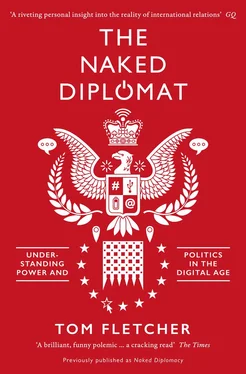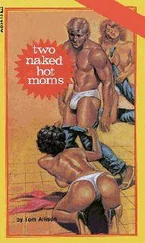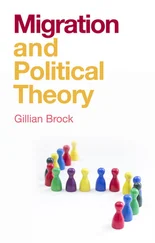William Collins
An imprint of HarperCollins Publishers
1 London Bridge Street
London SE1 9GF
www.WilliamCollinsBooks.com
First published as Naked Diplomacy in Great Britain by William Collins in 2016
Copyright © Tom Fletcher 2016
Tom Fletcher asserts the right to be identified as the author of this work
‘The Embassy’ (‘Sonnets from China XV’), from Collected Poems by W. H. Auden copyright © 1976 the Estate of W. H. Auden, by permission of Random House Inc.
Extracts from Yes, Minister and Yes, Prime Minister copyright © 1980 Jonathan Lynn and Antony Jay, by permission of Alan Brodie Representation Ltd, www.alanbrodie.com
A catalogue record for this book is available from the British Library
Cover design by Johnathan Pelham
All rights reserved under International and Pan-American Copyright Conventions. By payment of the required fees, you have been granted the non-exclusive, non-transferable right to access and read the text of this e-book on screen. No part of this text may be reproduced, transmitted, down-loaded, decompiled, reverse engineered, or stored in or introduced into any information storage and retrieval system, in any form or by any means, whether electronic or mechanical, now known or hereinafter invented, without the express written permission of HarperCollins.
Source ISBN: 9780008127589
Ebook Edition © June 2016 ISBN: 9780008127572
Version: 2017-02-20
To Louise, without whom this book would never have been written.
To Charlie, Theo and Twitter, without whom it would have been written much faster.
And to the colleagues who march towards the sound of gunfire, in order to try to stop it.
Cover
Title Page
Copyright
Dedication
Epigraph
INTRODUCTION TO THE PAPERBACK EDITION
PREFACE: The Diplomat Who Arrived Too Late
INTRODUCTION TO THE FIRST EDITION: Here Lies Diplomacy, RIP?
PART ONE – Glad-handing on the Shoulders of Giants: A Short History of Diplomacy
1. Early Diplomacy: From Cavemen to Consuls
2. Diplomacy By Sea: From Columbus to Copyboys
3. Diplomacy’s Finest Century
4. From Telephone to Television
5. From E-mail to E-nvoys
6. What Makes a Good Diplomat?
PART TWO – Statecraft and Streetcraft: Power and Diplomacy in a Connected World
7. iDiplomacy: Devices, Disruption and Data
8. The End of Secrecy? Assange, Snowden and the Death of Bond
9. Building New Power: Bombs, Books and Beckham
10. Using New Power: Only Connect
11. Selling Ladders for Other People to Climb Down
12. A Naked Diplomat
13. Envoy 2025
PART THREE – What Next?
14. Who Runs the Digital Century?
15. The Battle for Digital Territory
16. The Case for Optimism
17. A Progressive Foreign Policy ‘To Do’ List
18. Citizen Diplomacy
EPILOGUE: Valedictory
Acknowledgements
Further Reading
Notes
Index
About the Author
About the Publisher
As evening fell the day’s oppression lifted;
Tall peaks came into focus; it had rained:
Across wide lawns and cultured flowers drifted
The conversation of the highly trained.
Thin gardeners watched them pass and priced their shoes;
A chauffeur waited, reading in the drive,
For them to finish their exchange of views:
It looked a picture of the way to live.
Far off, no matter what good they intended,
Two armies waited for a verbal error
With well-made implements for causing pain,
And on the issue of their charm depended
A land laid waste with all its young men slain,
Its women weeping, and its towns in terror.
W. H. Auden, ‘The Embassy’
INTRODUCTION TO THE PAPERBACK EDITION
I would obviously like to claim that 2016 proved this book right. After all, in a post-truth world, we can all claim anything. In my favour, it was a year in which many of the themes of The Naked Diplomat – truth and lies online and offline; coexistence versus wall building; open versus closed societies; the implications of our inability to reach angry and frustrated parts of our societies – have been thrust into centre stage.
But nobody really called 2016. I predicted that of the United Nations, US, France and the UK, two would be run by women in 2017. I may have got the wrong two. It has been a logic-defying, irrational year, in which three acronyms officially entered the dictionary – ‘LOL’, ‘OMG’ and ‘WTF’. And many began to worry that liberalism could be confined to the dictionary.
Among the many ironies of 2016, Germany emerged as the bulwark against Fascism; the Pope emerged as the leading spokesman for freedom; China emerged as the defender of the Davos consensus; and a TV celebrity billionaire emerged as the voice of the ordinary American. Empowered citizens voted for policies they knew would make them poorer; for liars to clean up politics; and to take back control by reducing their global influence. And experts responded to accusations that they were no longer needed by being consistently wrong. Meanwhile, Russia bombed Syrian civilians to save them from terror. George Orwell, take a bow.
The beginning and end of chapters in history books can be pretty arbitrary. But 2016 is the end of the chapter that started in 1989, or maybe even 1945 or 1789. It could be the end of the American Age. It might mark the (hopefully temporary) resignation of America as a driving force for liberty throughout the world. Donald Trump’s election created a vacancy for leader of the free world. For the first time in my life, we can take nothing about the next year for granted, let alone the next decade: because 2016 is the new normal. We are in new and uncertain terrain.
I think three themes run through Brexit, the rise of Trump and the polarisation of political debate that we have seen.
Firstly, the West is in an Age of Distrust. Authority is one more devalued currency. The UK parliamentary vote on military action in Syria in 2013 was rejected because Iraq had destroyed confidence in the establishment’s ability to make sound foreign policy. Likewise, many rejected staying in the EU because MPs’ expenses, the banking crisis and EU mismanagement had destroyed confidence in Westminster, the Square Mile and Brussels. And – ironically for a tycoon and TV personality – Trump is a rejection of the establishment and mainstream media. YouGov report that public trust is plummeting not just in politics, the media and the banks, but also in teachers, doctors and the police.
So, institutions traditionally based on consent, deference and trust are failing, and politics is failing. For the first time in recent history, the challenge is not states with too much power, but too little. Declining powers such as Russia are more disruptive than rising ones. And the great powers don’t seem to want to exert great power. Meanwhile, a Europe used to summits where it discussed other countries as problems – Afghanistan/Pakistan, the Middle East, North Korea – is now finding itself on the agenda. On the global balance sheet, it has moved from being an exporter of solutions to an exporter of problems. And, as US Senator Mike Enzi says, ‘if you’re not at the table, you’re on the menu’.
Facing this new context, leaders and politicians are struggling to connect, to get their message through. As Shelley is quoted as saying of a rival, ‘he had lost the art of communication, but not alas the gift of speech’. And the politicians know it. One recent European leader told me: ‘We no longer think it is just the past that is another country. It is now the present that is another country.’ We all feel better connected but less well informed. For the first time, our problem is too much information, not too little. Being more in touch has reduced our ability to ‘reach out and touch people’. 1Hence the distrust.
Читать дальше












